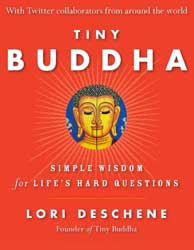 Now Featured at the Patheos Book Club
Now Featured at the Patheos Book Club
Tiny Buddha: Simple Wisdom for Life's Hard Questions
By Lori Deschene
Book Excerpt
Introduction
In March of 2007, when Twitter exploded at the South by Southwest Festival, more than 60,000 tweets addressed the question, "What are you doing? " At the time, I was certain I'd sooner post my organs for auction on eBay than choose a Twitter handle. I didn't see any benefit in using technology to narrate my life as it happened. Why would I want to update my social circle—let alone strangers—on my most mundane daily activities? I assumed that if I joined, I'd bore my friends with TMI and have less to discuss when I saw them in person—they'd already know I ate a Rice Krispies Treat at ten, practiced yoga at lunch, and seriously considered cutting my bangs at four. I thought I couldn't live mindfully if I traced my steps with a digital bread-crumb trail. If I did use the web to share random details about my everyday life, I'd want to answer a far more interesting question than, "What are you doing? "
In 2008 I realized how badly I'd underestimated that question. What was I doing? I was writing for a series of websites that didn't mean anything to me on a personal level. I was trying to figure out how to be an independent, valuable part of society after years of crawling, one inch at a time, out of self-loathing and depression—an ascent that felt as knuckle-draggingly prolonged as humans' evolution from apes. I was for all intents and purposes doing a lot better, but I was not feeling better about the things I was doing. And I was drowning in spiritual texts and self-help books looking for answers everywhere outside myself. What I wasn't doing was living an empowered life, driven by my passions and guided by my gut instincts.
After years of obsessing over who I was, it felt empowering to shift my focus to what I was doing. Suddenly I was considering that maybe Twitter wasn't as superficial as I thought it had to be. It could be like tofu and take the flavor of whatever it's marinated in—and I could mix it up as my taste buds demanded. That's the beauty of Twitter: each tweeter decides which questions to answer, and they can be as helpful and meaningful as you make them. Asking the questions that shape our lives and exploring potential solutions—now that was something worth doing.
The simultaneous lack and abundance of answers is the answer.
I had lots of questions to answer: What makes a person happy? How can you live a meaningful life? How do you move forward after a poor decision or disappointment that eats away at your sense of possibility? How can you push yourself out of your comfort zone and live the life you dream about? How can you find a sense of security in a world with so many unknowns? The list was endless, really.
No matter what religion we follow, what politics we support, what family we were born into, or where we've placed our roots, we all deal with universal problems. Regardless of our differences, we all live our lives around the same questions. How we answer them dictates the choices we'll make and what kind of person we'll be from moment to moment. Some answers are clichés that look great on paper but don't actually breathe when we inflate them and try to find a pulse. Others seem implausible and yet make a world of sense when we step inside them and wrap them around our circumstances. And others still can feel absolute for what seems like an eternity until life cross-examines them and reminds us how fragile most answers are.
Was I merely regurgitating words that felt good or feeling good about doing something with them?
The reality is there are very few concrete, one-size-fits-all answers to the big questions. According to Socrates, accepting that is the foundation to true wisdom. There's so much we can't know, understand, or predict in life. Yet if we learn to listen to ourselves and then to stop listening long enough to simply be in the world, open and available, the answers can seem so clear—answer, really. The real answer is that there are an infinite number of possibilities that we can explore to be happy, connected, engaged, and free. The simultaneous lack and abundance of answers is the answer.
Tiny Buddha evolved from that idea—the prospect of exploring different possibilities and then doing something with them so we can learn for ourselves what's right for each of us.
They say we teach what we need to learn, and this has been true for me. When I started tweeting a daily quote through @tinybuddha, I addressed the questions that felt most paralyzing in my world. I looked for quotes about letting go of stress and anxiety because I'd carried so much around for years it oozed from my skin, like a little too much garlic. I read countless books, highlighter in hand, looking for insights about being happy in the present because I'd spent so much time obsessing over the past and worrying over the future that I disbelieved it was possible to liberate the now. Once upon a time, I thought mindfulness was a comforting illusion—something spoon-fed to me like Santa, the American Dream, and free lunches.




